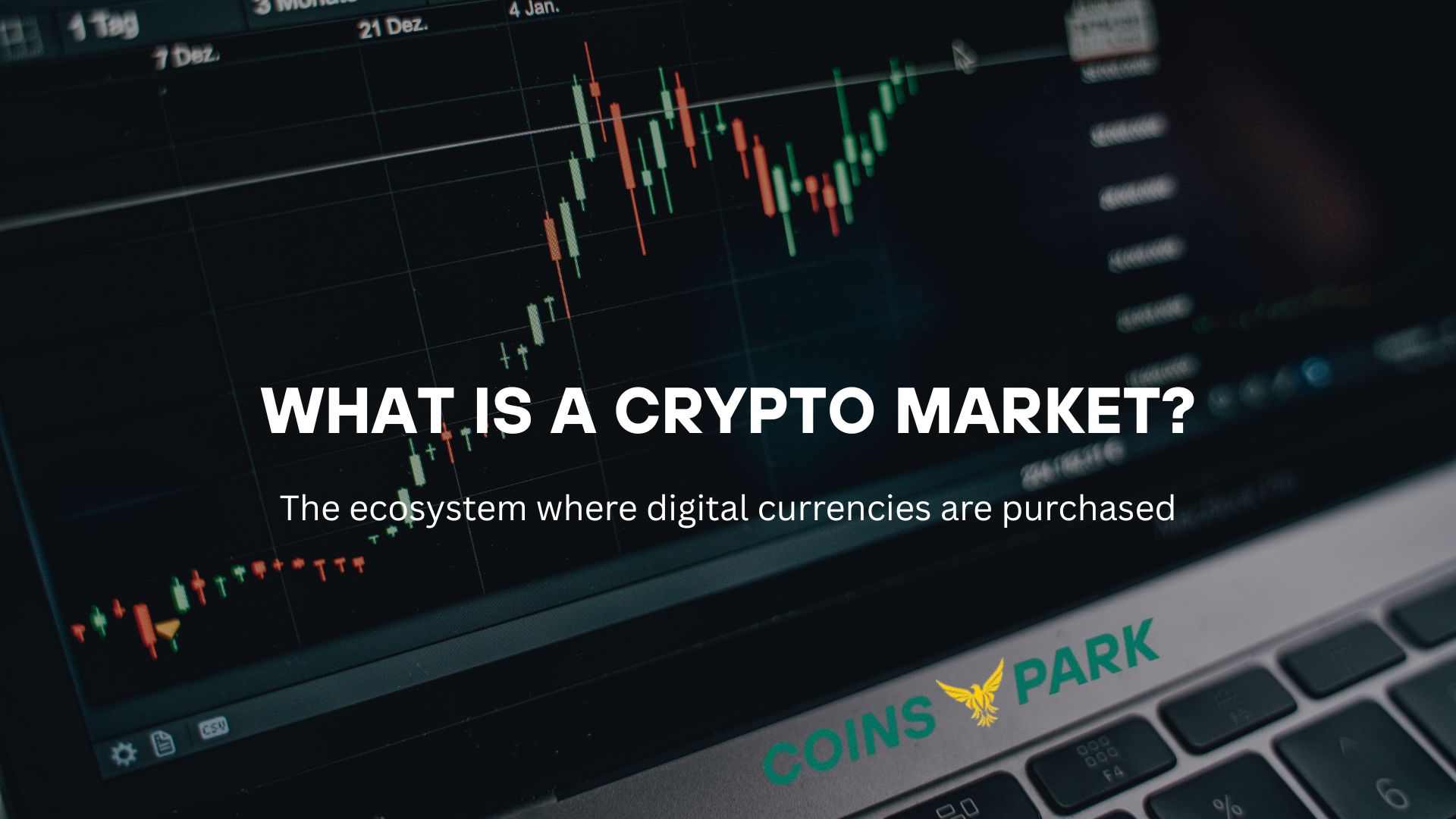What Is a Crypto Market? The ecosystem where digital currencies are purchased, sold, traded, and kept is called the “crypto market,” short for “cryptocurrency market.” The crypto market operates similarly to traditional financial markets. Still, it is solely reliant on digital assets like Bitcoin (BTC), Ethereum (ETH), and thousands of other cryptocurrencies rather than fiat currencies like the US dollar or tangible commodities like gold.
Anyone interested in blockchain technology, digital money, or investing must understand the cryptocurrency market. Let us examine the definition of the cryptocurrency market, its components, its operation, and the reasons it has grown to be such a powerful force in world finance.
(1) What Are Cryptocurrencies?
Understanding the primary asset that the market deals in, cryptocurrencies, is crucial before delving into the market itself.
Virtual or digital currencies that are encrypted are known as cryptocurrencies. They use blockchain technology, a distributed, decentralized ledger that keeps track of every transaction made over a network of computers.
Among the most popular cryptocurrencies are:
- Bitcoin (BTC) – the first and most valuable cryptocurrency.
- Ethereum (ETH) – known for enabling smart contracts and decentralized applications.
- Tether (USDT) – a stablecoin pegged to the U.S. dollar.
- Binance Coin (BNB), Solana (SOL), XRP, Cardano (ADA), and many others.
Because they are not governed by a government or bank, cryptocurrencies are attractive to people looking for alternative investing and money options.
(2) What Is the Crypto Market?
The crypto market is a decentralized, international digital marketplace where people trade cryptocurrency. It includes:
- Buyers and sellers are exchanging digital assets.
- Exchanges where trading takes place.
- Market participants such as traders, investors, developers, and institutions.
- Market infrastructure, like wallets, blockchain networks, and price tracking tools.
The cryptocurrency market is open around the clock, every day of the year, enabling constant trading throughout the world, in contrast to traditional stock markets, which are only open during certain hours on business days.
(3) Components of the Crypto Market.
Here are the key elements that make up the crypto market.
A. Crypto Exchanges: Users can purchase, sell, and exchange bitcoins on these platforms. There are two kinds.
- Centralized Exchanges (CEXs): Operated by companies (e.g., Binance, Coinbase, Kraken), these platforms facilitate trading and often hold users’ funds.
- Decentralized Exchanges (DEXs): These operate without a central authority, using smart contracts to execute trades directly between users (e.g., Uniswap, PancakeSwap).
B. Trading Pairs
Cryptocurrencies are traded in pairs on exchanges. For instance:
- BTC/USD: Buying Bitcoin with U.S. dollars.
- ETH/BTC: Trading Ethereum for Bitcoin.
Prices are influenced by supply and demand, much like in conventional markets
C. Wallets
Digital tools called bitcoin wallets are used to store your cryptocurrency. Two types of machines exist:
- Hot wallets (connected to the internet).
- Cold wallets (offline storage, like hardware wallets).
D. Market Participants
The market is made up of:
- Retail traders (individuals).
- Institutional investors (hedge funds, companies).
- Developers and miners.
- Speculators who trade short-term.
- Hodlers who hold for the long term.
(4) How the Crypto Market Works.
Peer-to-peer technology, blockchain networks, and cryptographic validation are how the cryptocurrency market operates.
Every trade that takes place is documented on a blockchain, decentralized networks, and nodes (computers) confirm and agree on the transaction using consensus methods like Proof of Work (PoW) or Proof of Stake (PoS). The exchange logs the transaction and shows it in your balance in controlled markets.
The following factors affect price movement in the cryptocurrency market:
- Market sentiment
- News and regulations
- Technology updates
- Adoption rates
- Supply dynamics (e.g., Bitcoin halving)
Because of the cryptocurrency market’s extreme volatility, values can fluctuate drastically, often by double digits in a single day.
(5) Why the Crypto Market Matters.
The cryptocurrency market has grown into a multitrillion-dollar sector that is increasingly influencing world finance. It is significant because:
- It presents financial innovations such as NFTs (Non-Fungible Tokens) and DeFi (Decentralized Finance).
- It offers financial inclusion to people without access to traditional banking.
- It promotes decentralization and self-sovereign finance.
- It allows for borderless payments and real-time transactions.
Large firms, governments, and organizations are now closely monitoring the situation, with several investigating central bank digital currencies (CBDCs) or making investments in crypto assets.
(6) Risks of the Crypto Market.
Notwithstanding the potential, there are serious hazards associated with the cryptocurrency market:
- Volatility: Prices can swing wildly.
- Security threats: Hacks, phishing, and scams are common.
- Regulatory uncertainty: Government policies are evolving and can affect market access.
- Lack of investor protection: Especially in unregulated or decentralized environments.
Using secure wallets, doing your research (DYOR), and never investing more than you can afford to lose are all crucial.
Conclusion.
The cryptocurrency market is a vibrant, rapidly expanding industry that signifies a significant change in the way value is produced and traded online. Knowing how this market functions is the first step to investing sensibly, regardless of your level of experience.
It has fascinating possibilities, but it also needs prudence, knowledge, and an open mind. The market will change along with cryptocurrency, bringing with it new inventions, tools, and difficulties.




